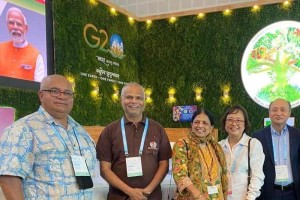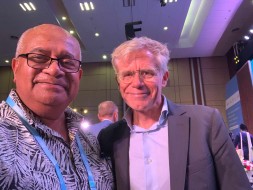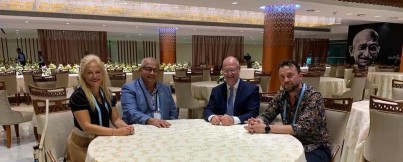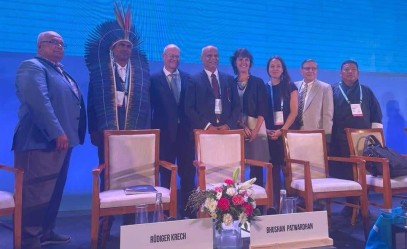
INTERVIEW: Summit recognises value of traditional medicine
HPF’s Executive Director and IUHPE President Sione Tu’itahi was recently invited by the World Health Organisation (WHO) to be an advisor at its inaugural high-level global Summit on Traditional Medicine in Gandhinagar, Gujarat, India from Aug 17 - 18.
In a written interview Sione discusses the significance of the landmark summit, what his role as an advisor entailed, and what some of the next steps will be in implementing the WHO strategic approach to include traditional medicine.
The contribution of traditional medicine to health promotion and planetary health is huge says Sione. ‘Traditional medicine is not just about healing humans when they are not well. It has elements that are about promoting wellbeing through lifestyle, nutrition and taking care of the environment, which provides many of the natural resources for traditional medicine.
‘Traditional medicine is an important component of Indigenous knowledge systems, and other knowledge systems.’
INTERVIEW:
Q: As this was the first-ever summit on traditional medicine to be held, it must have been very significant! Can you tell

Sione caught up with the WHO Deputy Director General - Universal Health Coverage - Life Course Division Dr Bruce Aylward
us a bit more about the summit, and its aims?
SIONE: The summit was to mobilize political commitment and evidence-based action on traditional medicine, which is a first port of call for millions of people worldwide to address their health and wellbeing needs. The aim is to advance the WHO-led collective effort to include traditional medicine in its many forms in the process of healing humanity and the planet.
Q: You were part of an advisory group at the summit? What was your role as part of this group and what did it entail?
SIONE: There are 11 of us invited by WHO from around the world to advise on most aspects of the summit – from its theme, speakers, and contents, as well as follow-up work. The summit was one of several steps towards implementing the WHO strategic approach to include traditional medicine. An earlier step was the establishment a WHO Global centre for Traditional Medicine in India, with the support of its government. As WHO puts it, the centre will be ‘a knowledge hub with a mission to catalyse ancient wisdom and modern science for the health and wellbeing of people and the planet.’
Q: What contribution does traditional medicine make to health promotion and planetary health?
SIONE: Traditional medicine is not just about healing humans when they are not well. It has elements that are about promoting well-being through lifestyle, nutrition and talking care of the environment, which provides many of the natural resources for traditional medicine. Traditional medicine is an important component of Indigenous knowledge systems, and other knowledge systems.

It is now well documented that Indigenous knowledge systems are very effective in sustaining the health of the planet and human wellbeing. For example, 80 per cent of the biodiversity on land is found in lands where Indigenous peoples live, despite the colonising oppressions of their rights and resources, according to the World Bank.
Like cultural diversity, biodiversity is crucial for the sustainability of humanity and the planet. Without biodiversity, the resources and essential ingredients for traditional medicine will be unsustainable.
(Strategic conversation around the table with Dr Ruedigar Krech, Director of Health Promotion WHO, Geneva, 3rd fr left. Far left is Dr Cristina Romanelly, Biodiversity, Climate Change and Health, WHO. Far right is Prof Georg Siefert, member of the advisory group.)
Q: How did you personally find the event and what were some of the highlights for you?
SIONE: A major highlight for me was that the summit was a significant effort to enable diverse peoples and cultures of our one human family to work together for our collective wellbeing, with the co-leadership of WHO and India. It offers insights into how as a globalised society we can contribute our diverse knowledge and wisdom through collaboration and learning from one another, to ensure the wellbeing of our common home, Planet Earth, and the wellbeing of our human family.

Sione, left, moderated the first panel on planetary health, indigenous knowledge and traditional medicine. (Photo by Cristina Romanelly)
One observation I have, and a personal highlight is that India is a central hub of ancient and contemporary intellectual, philosophical, and spiritual knowledge systems, including wellbeing and healing. I think it’s significant and timely that it has a leading role in this global, collaborative effort with WHO to address our collective wellbeing at the time when our planet is broken and as the UN Secretary -General said recently, ‘we are into the era of global boiling’.
Q: Do you think the summit achieved what it set out to do, and what are some of the next steps after this? How often will these summits be held?
SIONE: The summit successfully brought together key stakeholders across the world at local, national, and international levels. There is long-term commitment from all, especially from WHO and the Government of India. Like all major undertakings, there are challenges especially when you work across the complexity of cultural diversity. It is a long-term journey and so we should work with great patience and wisdom.
But these challenges are not insurmountable when there is commitment by all to the common goal. At the end of the day, we are all members of one human family on one earth and a common future.
The better choice is to work together for our collective wellbeing. Given the floods, fires, global boiling, and wars we are facing and the suffering that they bring to millions of peoples across many nations, it is common sense to not pick the other choice of doing nothing or going in the opposite direction.
Our advisory group and other colleagues continue to engage on post-summit activities. Our term is until early next year. A declaration from the summit has been released, which will provide a guiding pathway for future steps. Click HERE to download the declaration.
(Banner photo: Sione, left, and other members of the WHO advisory group having a final check on the preparations for the summit)